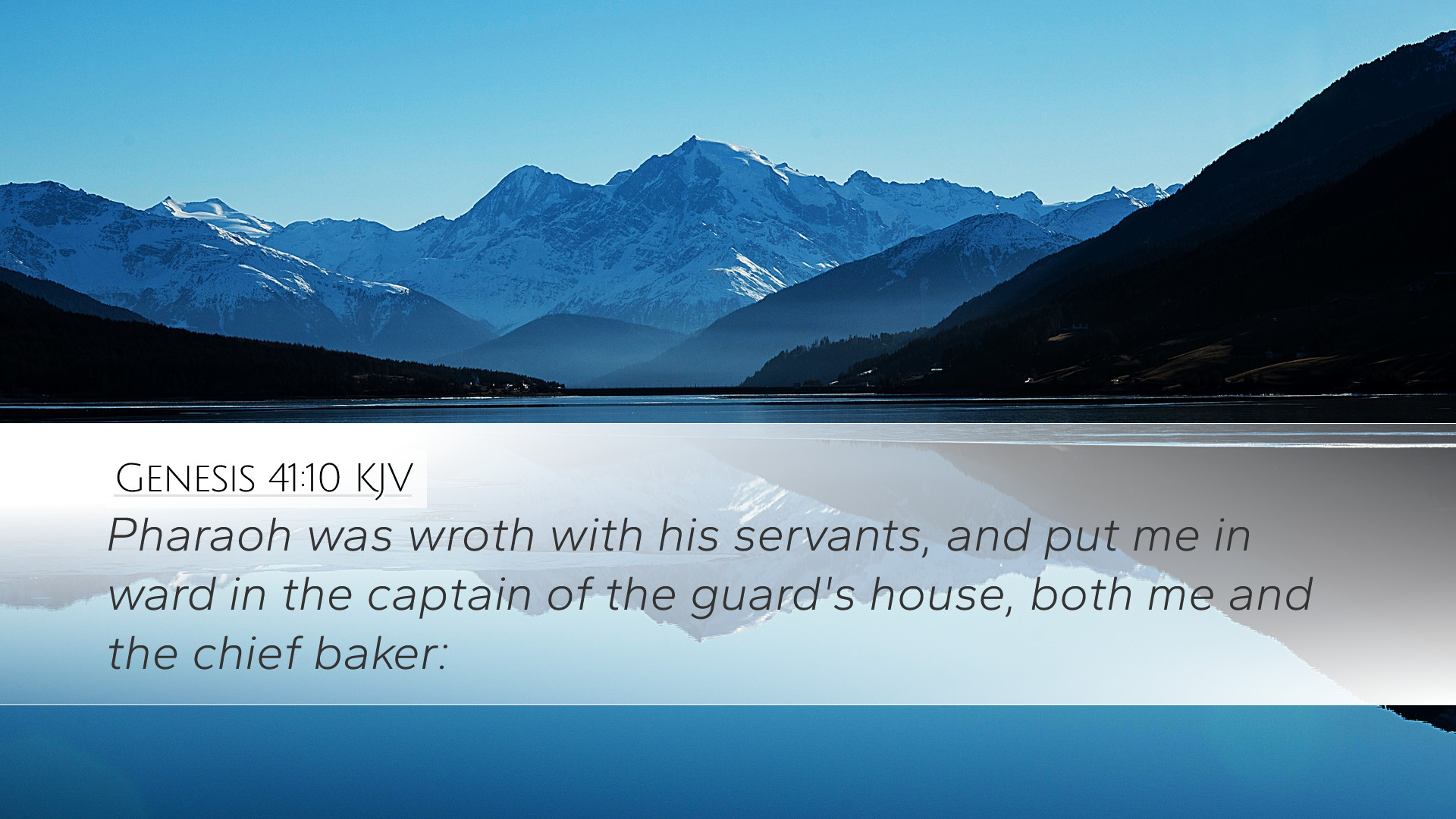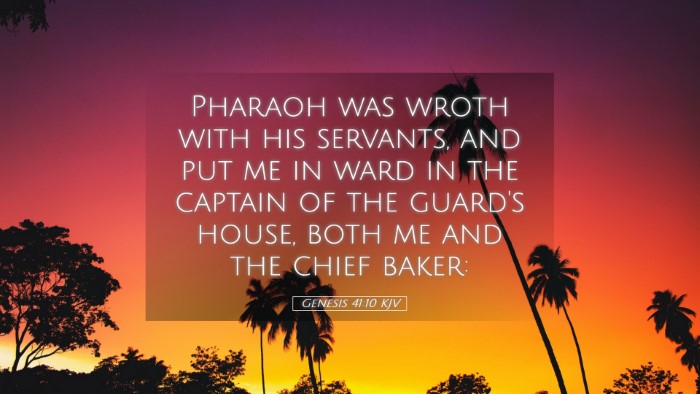Commentary on Genesis 41:10
Verse: "Pharaoh was angry with his servants, and put me in ward in the captain of the guard's house, both me and the chief baker." (Genesis 41:10, KJV)
Contextual Overview
This verse is part of the narrative concerning Joseph's rise to prominence in Egypt. It reveals how Joseph came to be in the position to interpret Pharaoh's dreams, an event that would ultimately lead to his elevated status. The account centers on the experiences of two officials – the chief cupbearer and the chief baker – who had offended Pharaoh, leading to their imprisonment. This moment is critical as it sets the stage for Joseph's interpretation of the dreams, which would have significant implications for the nation of Egypt and for Joseph's future.
Insights from Public Domain Commentaries
Matthew Henry's Commentary
Matthew Henry emphasizes the sovereign hand of God in Joseph's life, bringing him from a place of prison to a place of prominence through divine providence. In his commentary, he points out that God's purpose can sometimes be fulfilled through our unfortunate circumstances. The cupbearer’s recollection of Joseph at this moment is a key turning point: “It was God who was working behind the scenes, directing events even while His servant was in the depths of obscurity and misery.”
Albert Barnes' Notes on the Bible
Albert Barnes elaborates on the significance of this verse within the broader narrative of Genesis. He highlights that the mention of Joseph by the chief cupbearer serves as a reminder of God’s plan unfolding. Barnes notes that the cupbearer had forgotten Joseph until a moment of need arose, reflecting the human tendency to overlook God's instruments until they are required. He suggests that this forgetfulness illustrates a common theme in Scripture—how God uses the weak and forgotten in times of need, thus promoting His purposes. This situation invites reflection on how divine timing plays a crucial role in the realization of God’s plans.
Adam Clarke's Commentary
Adam Clarke comments on the psychological tension involved in this situation—how personal betrayals and disappointments often lead people to despair, yet Joseph remained hopeful. Clarke suggests that Joseph's interpretive skills may not have been recognized initially, but this incident would showcase his abilities further. He notes that Joseph’s interpretation of the chief baker’s dream led to the baker’s execution, showing that while some would meet grave judgment, others, like the cupbearer, would experience restoration. Clarke emphasizes that true faith persists in adversity, reflecting the character of Joseph as a model for all believers.
Theological Implications
This verse invites a deeper theological reflection on several key themes:
- The Sovereignty of God: As seen in Joseph's journey from obscurity to prominence, God's sovereignty operates within and through human decisions and the flow of events.
- Divine Providence: The cupbearer's remembrance of Joseph at a crucial moment underscores the concept of divine providence, showcasing how God orchestrates circumstances for a greater purpose.
- Redemption and Restoration: The contrasting fates of the chief baker and the cupbearer present a powerful narrative about God's ability to redeem and restore—demonstrating mercy in the face of impending judgment.
Practical Applications
For pastors, students, and scholars, the account surrounding Genesis 41:10 offers several practical takeaways:
- Encouragement in Trials: Joseph's patience and faith in God serve as a reminder that times of trial may be used for God's glory, and encourage believers to persevere in faith.
- The Importance of Remembrance: The role of the cupbearer emphasizes how we must not forget those who have helped us in our journeys. It invites reflection on our relationships and our willingness to remember and uplift those who have been instrumental in our lives.
- God’s Timing: Believers are reminded that God's timing is often different from human expectations. This verse encourages readers to trust God's plan, even when the path seems uncertain.
Conclusion
Genesis 41:10 serves as a critical juncture in the narrative of Joseph, showcasing the interplay between human actions and God’s providential care. The reflections offered by public domain commentaries illustrate the depth of wisdom encapsulated in this verse. It invites deep introspection and provides a faithful guide for understanding the sovereignty and faithfulness of God in our lives.


